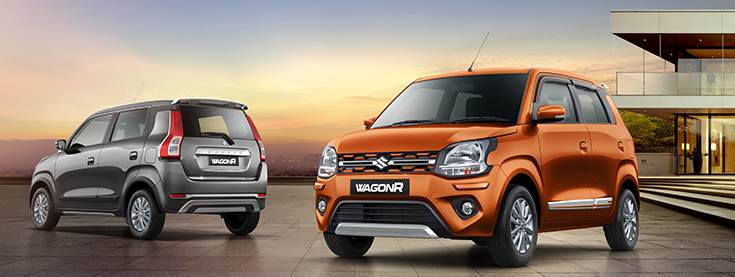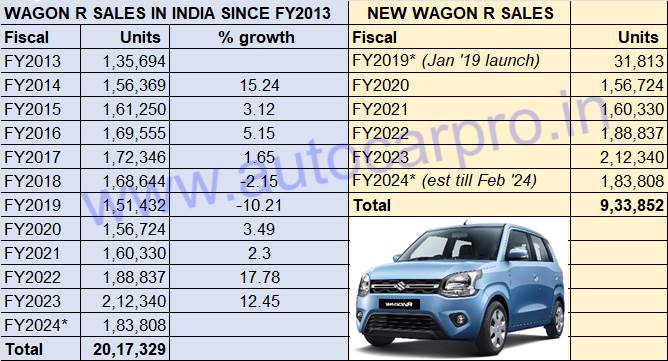The new and third-generation Wagon R, launched in January 2019 in India, has become the latest Maruti Suzuki model to surpass the 900,000-unit sales milestone in the domestic market. In the ongoing fiscal, the Brezza compact SUV and the Ertiga MPV have been the other Maruti passenger vehicles to have notched the 900,000 sales landmark in the current fiscal.
The Maruti Wagon R, India’s best-selling passenger car for the second year in a row in FY2023 with a record 212,340 units, has registered wholesales of 183,808 units in the first 11 months of FY2024 and drove past the cumulative 900,000 sales milestone in December 2023. Average monthly sales of 16,709 units in the current fiscal means the Wagon R could wrap up FY2024 with a total which is a shade under the FY2023 total.
The Wagon R, which is celebrating its 25th anniversary this year, has to date sold over 3.16 million units to date. The popular midsize hatchback, which was launched in 1999, had gone past the 3-million mark in May 2023.

A quick look at the sales data of the Wagon R, which has built a formidable reputation for itself as a spacious, practical, easy-to-live-with hatchback for reasonable money, reveals that sales have picked up in the past two fiscals (see Wagon R wholesales data table above).
From FY2013 through to FY2024 (till February 2024), a total of 20,17,329 Wagon Rs have been sold in India, accounting for 64% of the total 3.16 million units sold to date.

Third-gen Wagon R and CNG variant accelerate sales
The Wagon R growth story got a fresh charge in January 2019 with the launch of the third-generation Wagon R. Since then, this model has maintained year-on-year growth for fourth fiscals in a row albeit it just might falter to beat FY2023’s 212,340 units. At end-February 2024, with estimated wholesales of 183,808 units, it is 28,532 units shy of that total.
Nevertheless, the Wagon R is holding on to its rank as the best-selling Maruti in the ongoing fiscal, ahead of the Baleno (180,019 units) and the Swift (179,593 units). In the last 11 months, Maruti Suzuki has sold a total of 758,171 compact cars (Baleno, Celerio, Dzire, Ignis, Swift, Tour S, Wagon R) – the Wagon R accounts for 24% of that.
Of the total 1,607,163 passenger vehicles the company has sold between April 2023-February 2024, the Wagon R accounts for 11%, clearly establishing the prominent role it continues to play for the company.
The Wagon R, which is built on Suzuki’s Heartect platform (shared with the Celerio, Swift and Baleno models) has two engine options comprising a 1.0-litre, three-cylinder petrol which develops 68hp and 90 Nm of torque, and a more powerful 1.2-litre four-cylinder petrol with 83hp and 113 Nm. Both engines have the options of manual and AMT gearboxes. The Wagon R 1.0 is also available with a factory fitted CNG kit, and this variant has become a strong growth engine for the model.
The Wagon R is available in nine variants, with pricing starting from Rs 637,000 for the base 1.00-litre LXi petrol through to the top-end 1.2-litre ZXi+ AMT which has a sticker tag of Rs 851,000 (both prices, on-road Delhi).
The Wagon R was one of the first Maruti Suzuki models to get the CNG treatment back in March 2010 and remains the best-selling CNG model for the company. Since then, Maruti has expanded its CNG car and SUV portfolio to 13 models (Alto K10, Baleno, Brezza, Celerio, Dzire, Eeco, Ertiga, Grand Vitara, S-Presso, Swift, Wagon R, XL6 and the Fronx) and has a vice-like grip on the CNG passenger vehicle market.

Flex-fuel Wagon R
When it comes to use of alternate fuels as part of its decarbonisation programme, Maruti Suzuki chose the Wagon R as the model that can run on an ethanol-petrol blend between 20% (E20) and 85% (E85). The BS 6 compatible, flex-fuel prototype car powered by a 1.2-litre petrol engine has been designed and developed locally in India by Maruti Suzuki engineers, with necessary support from Suzuki Motor Corporation, Japan.
The Wagon R Flex Fuel prototype vehicle, which has an upgraded engine designed specifically to use higher ethanol-blended petrol, has the potential to reduce tailpipe GHG emissions by 79% in comparison to a conventional petrol engine. It was recently showcased at the Bharat Mobility Global Expo in early February in New Delhi.
ALSO READ:
Maruti Suzuki sells 160,271 PVs in February, UVs contribute 38%
Demand for small cars likely to return in second-half 2026: Maruti Suzuki
SUVs, MPVs account for 60% of 3.84 million PV dispatches in first 11 months of FY2024
